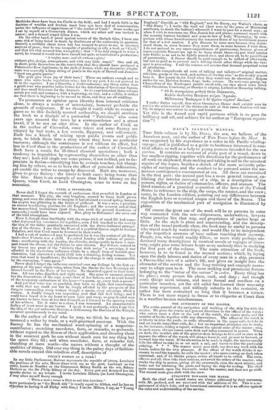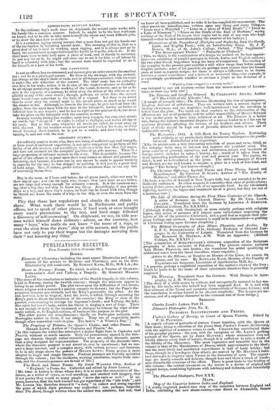DANA ' S SEAMAN'S MANUAL.
Tuts little volume is by Mr. DANA, the son, we believe, of the American poet, and the author of Two Years before the Mast. It was suggested by his experience as a sailor in his Pacific whaling- voyage ; and is published as a guide to landsmen interested in nau- tical affairs, as well as a help to young persons intended for the sea service. It contains an account of every part of a vessel, down to her smallest rigging, together with directions for the performance of all work on shipboard, from making and taking in sail to the minutest repairs of the ropes, besides a sketch of the more scientific prin- ciples of navigation, and the conduct to be pursued under the nu- merous contingencies encountered at sea. All these are contained in the first part : the second part has a more general interest, ex- hibiting the interior economy of a ship, in a description of the powers, rights, or duties of commander, officers, and seamen. The third consists of a practical exposition of the laws of the United States in reference to the ship, the cargo, the master, and the crew ; notes, in the London edition, pointing out any differences between the English laws or nautical usages and those of the States. The exposition of the mechanical part of navigation is illustrated by plates.
Of course the great use of the work will be to persons in some way connected with the sea—shipowners, underwriters, lawyers whose practice lies that way, and proprietors of yachts large or little. As the style is plain and unpretending, and the descrip- tion of the vessel perfectly clear, the book may be useful to persons who travel much by water-trips, and would like to be independent of the imperfect answers of busy sailors touching their mystery. People, too, who would readily follow, or more truly perhaps un- derstand many descriptions in nautical novels or voyages of disco- very, might pass some leisure hours more uselessly than in studying the first part of the volume. The main attraction of the book, however, is to be found in the second section ; which, by laying open the daily labours and duties of every man in a ship, presents a DEron-like view of a sailor's life, and gives an insight into the character of the service and the long training and example neces- sary to adapt men to it. The most striking and prominent feature belonging to the " natur of the sarvus" is order. Every thing has its place ; every person his place, rank, and duty ; and though some things seem minute and many formal and needless on a particular occasion, yet the old sailor has learned their necessity from long experience, and willingly submits to the restraint, or rather has been restrained so long that it becomes a nature. There is not more regard to forms or to etiquette at Court than in a weather-beaten merchantman.
THE AUTHORITY OP THE MASTER.
The entire control of the navigation and working of the ship lies with the master. He gives the course antr general directions to the officer of the watch ; who enters upon a slate at the end of the watch, the course made, and the number of knots, together with any observations. The officer of the watch is at liberty to trim the yards, to make alterations in the upper sails, to take in and set royals, topgallant-sails, &c. ; but no important alteration can be made, as, for instance, reeling a topsail, without the special order of the master ; who, in such cases, always comes upon deck and takes command in person. When on deck, the weather side of the quarter-deck belongs to him, and as soon as he appears the officer of the watch will always leave it, and go over to leeward, OP forward into the waist. If the alteration to be made is slight, the master usually tells the officer to take in or set such a sail, and leaves to him the particular ordering. • * • The master never goes aloft, nor does any work with his hands, unless for his own pleasure. If the officer of the watch thinks it ne- cessary to reef the topsails, he calls the master; who upon coming on deck takes command, and, if he thinks proper, orders all hands to be called. The crew, officers and all, then take their stations, and await the orders of the master; who works the ship in person, giving all the commands, even the most minute, and looks out for trimming the yards and laying the ship for reefing. The chief mate commands upon the forecastle, under the master, and does not go aloft. The second mate goes aloft with the crew.
ETIQUETTE TOWARDS THE MATES.
Both the chief and second mates are always addressed by their surname*, with Mr. prefixed, and are answered with the addition of Sir. This a re- quirement of ship's duty, and an intentional omission of it is an offence against the rules and understanding of the service.
DISTINCTIONS BETWEEN MATES. •
In the,ordinaty day's work done on shipboard, the second mate works with his hands like a common seaman. Indeed, he ought to be the best workman on board, and to be able to take upon himself the nicest and most difficult jobs, or to show the men how to do them. • • It is a common saying among seamen that a man does not get his hands out of the tar-bucket by becoming second mate. The meaning of this is, that as a great deal of tar is used in working upon rigging, and it is always put on by Wad, the second mate is expected to put his hands to itas the others do. If the chief mate were to take hold upon a piece of work, and it should be necessary to put any tar on it, he might gall some one to tar it for him, as all labour by baud is voluntary with hum; but the second mate would be expected to do it for himself, as a part of his work.
THE CARPENTER
Is not an offieer,has no command, and cannot give an order even to the smallest boy; yet he is a privileged person. He livesiu the steerage, with the steward, has charge of the ship's chest of tools, and in all things connected with his trade is under the sole direction of the master. The chief mate has no authority over him in his trade, unless it be in case of the master's absence or disability. In all things pertaining to the working of the vessel, however, and as far as he acts in the capacity of a seaman he must -obey the orders of the officers as bn- plicitly as any of the crew would; though, perhaps, an order from the second mate would come somewhat in the form of a request. Yet there is no doubt that he must obey 'the second mate in his proper place, as much as he would the master in his. Although he lives in the steerage, he gets his food from the galley, from the same mess with the men in the forecastle, having no better or different fare in any respect ; and he has no right on the quarter-deck, but must take his place onthe forecastle with the common seamen. In many vessels, during fine weathersupon long voyages, the carpenter stands no watch, but "sleeps in" at night, is called at daylight, and works all day at his trade. But in this case, whenever all hands are called, he must come up with the rest. In bad weather when he cannot well work at his trade, or if the vessel becomes short-banded, he is put in a watch, and does duty on deck, turning in and out with the rest.
ORDINARY SEAMEN.
An ordinary seamen is one who, from not being of sufficient age and strength, or from want of sufficient experience, is not suite competent to perform all the duties of an able seamen, and accordingly receives a little less than full wages, and does not contract for the complete qualities of an able seaman. There is a large proportion of ordinary seamen in the navy. This is probably because the power of the officers is so great upon their long cruises to detect and punish any deficiency, and because, if a man can by any means be made to appear wanting in capacity for the duty be has shipped to perform, it will justify a great deal of hard usage. Men, therefore, prefer rather to underrate than to run any risk of overrating themselves.
DOTS.
Boy is the term, as I have said before, for all green hands whatever may be
their size or age ; and also for boys, who, though they have hands, at sea before, are not large and strong enough for ordinary seamen. It is the common say- ing, that a boy does not ship to know any thing. Accordingly, if any person ships as a boy, and upon boy's wages, no fault can be found with him, though he should not know the name of a rope in the ship, or even the stem from the stern.
Pity that these last regulations and checks do not obtain on shore. What work there would be in Parliament and public offices, not to speak of other places, if hard work at once brought every man's pretensions to the test, and hard usage followed a discovery of self-overrating! On shipboard, we see, an able sea- man writes himself down ordinary : ashore, on the contrary, how many" boys," who really do not know "the name of a rope, or even the stem from the stern," ship as able seamen, and the public have not only to pay their wages but the damages accruing from their " not knowing any thing.'



























 Previous page
Previous page